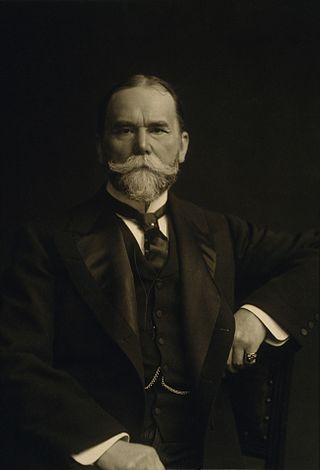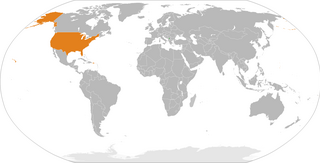
Serbia and Montenegro, known until 2003 as the Federal Republic of Yugoslavia, FR Yugoslavia or simply Yugoslavia, was a country in Southeast Europe located in the Balkans that existed from 1992 to 2006, following the breakup of the Socialist Federal Republic of Yugoslavia. The country bordered Hungary to the north, Romania to the northeast, Bulgaria to the southeast, North Macedonia to the south, Croatia and Bosnia and Herzegovina to the west, and Albania to the southwest. The state was founded on 27 April 1992 as a federation comprising the Republic of Serbia and the Republic of Montenegro. In February 2003, it was transformed from a federal republic to a political union until Montenegro seceded from the union in June 2006, leading to the full independence of both Serbia and Montenegro.
The Rambouillet Agreement, formally the Interim Agreement for Peace and Self-Government in Kosovo, was a proposed peace agreement between the Federal Republic of Yugoslavia and a delegation representing the ethnic Albanian majority population of Kosovo. It was drafted by the North Atlantic Treaty Organization (NATO) and named for the Château de Rambouillet, where it was initially proposed in early 1999. Among other things, the accords called for 30,000 NATO peacekeeping troops in Kosovo; an unhindered right of passage for NATO troops on Yugoslav territory; and immunity for NATO and its agents to Yugoslav law. Yugoslavia's refusal to sign the accords was used by NATO to justify the 1999 bombing of Yugoslavia.

The London Naval Treaty, officially the Treaty for the Limitation and Reduction of Naval Armament, was an agreement between the United Kingdom, Japan, France, Italy, and the United States that was signed on 22 April 1930. Seeking to address issues not covered in the 1922 Washington Naval Treaty, which had created tonnage limits for each nation's surface warships, the new agreement regulated submarine warfare, further controlled cruisers and destroyers, and limited naval shipbuilding.

The Israel–Jordan peace treaty, sometimes referred to as the Wadi Araba Treaty, is an agreement that ended the state of war that has existed between the two countries since the 1948 Arab–Israeli War and established mutual diplomatic relations. In addition to establishing peace between the two countries, the treaty also settled land and water disputes, provided for broad cooperation in tourism and trade, and obligated both countries to prevent their territory being used as a staging ground for military strikes by a third country.

Warren Minor Christopher was an American lawyer, diplomat and politician. During Bill Clinton's first term as president, he served as the 63rd United States Secretary of State.

The Washington Naval Conference was a disarmament conference called by the United States and held in Washington, D.C., from November 12, 1921, to February 6, 1922. It was conducted outside the auspices of the League of Nations. It was attended by nine nations regarding interests in the Pacific Ocean and East Asia. Germany was not invited to the conference, as it had already been disarmed under the terms of the Versailles Treaty. Soviet Russia was also not invited to the conference. It was the first arms control conference in history, and is still studied by political scientists as a model for a successful disarmament movement.
The Treaties for the Limitation of Naval Armament were numerous accords in the 1920s signed variously by the United States, Great Britain, Japan, Italy and France. The treaties were an outgrowth of the Washington Naval Conference, held by the US in 1921–22.

The Nine-Power Treaty (Japanese: Kyūkakoku Jōyaku or Nine-Power Agreement was a 1922 treaty affirming the sovereignty and territorial integrity of the Republic of China as per the Open Door Policy. The Nine-Power Treaty was signed on 6 February 1922 by all of the attendees to the Washington Naval Conference: Belgium, China, France, Great Britain, Italy, Japan, the Netherlands, Portugal, and the United States.
There have been a number of Four Power also called Quadripartite agreements and structures:

A treaty battleship was a battleship built in the 1920s or 1930s under the terms of one of a number of international treaties governing warship construction. Many of these ships played an active role in the Second World War, but few survived long after it.

Kosovo–United States relations are diplomatic relations between the Republic of Kosovo and the United States of America. The United States officially recognized Kosovo as a country, which declared independence from Serbia on February 17, 2008, the next day.

Kosovo unilaterally declared independence from Serbia in 2008, a move which Serbia rejects. Serbia does not recognize Kosovo as an independent state and continues to claim it as the Autonomous Province of Kosovo and Metohija. Initially there were no relations between the two; however, in the following years there has been increased dialogue and cooperation between the two sides.
The Belgrade–Pristina dialogue is a series of EU-facilitated talks between the governments of Serbia and Kosovo. Serbia claims Kosovo as its southern province under United Nations administration, and rejects its independence. Kosovo considers Serbia as a neighboring state. The negotiations began in March 2011, three years after Kosovo declared independence. They are the first negotiations between the two entities since Kosovo declared independence in February 2008.

Avdullah Hoti is a Kosovan politician, who served as the prime minister of Kosovo from 3 June 2020 until 22 March 2021. He previously served as the minister of Finance of Kosovo between 2014 and 2017 in the PDK/LDK coalition government.

The Kosovo and Serbia economic normalization agreements, informally known as the Washington Agreement, are a pair of documents in which Kosovo and Serbia agreed to facilitate economic normalization among themselves. The documents were signed by the Prime Minister of Kosovo Avdullah Hoti and the President of Serbia Aleksandar Vučić on September 4, 2020, at the White House, in the presence of the US President Donald Trump.

The Bahrain–Israel normalization agreement, officially Abraham Accords: Declaration of Peace, Cooperation, and Constructive Diplomatic and Friendly Relations is an agreement to normalize diplomatic and other relations between Bahrain and Israel. The agreement was announced by President Donald Trump on September 11, 2020, and followed on from a joint statement, officially referred to as the Abraham Accords, by the United States, Israel and the United Arab Emirates (UAE) on August 13, 2020. It was formally signed on September 15, 2020, at the White House in Washington, D.C., and made Bahrain the fourth Arab state to recognize Israel and the second within a month.

Albania–Yugoslavia relations were historical foreign relations between Albania and now broken up Yugoslavia. With occasional periods of friendly relations or efforts to improve relations, the two countries predominantly maintained cold or openly hostile relations. The period of close relations developed right after the end of World War II when Yugoslavia pushed for socioeconomic integration of Albania into Yugoslavia within the Balkan Federation, but they turned into sharp antagonism after the 1948 Tito–Stalin split.
Normalization agreement may refer to:












